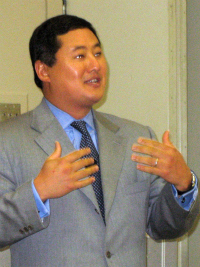Bush administration vs. the JAGs (II): The history of a strategic blunder

In response to my query
about whether there is a good history available of how the military's JAG corps
resisted the Bush administration's urgings to disregard the Geneva Conventions
and other laws, retired Air Force Reserve Brig. Gen. Ed Rodriguez suggested
reading chapter 12 of Charlie Savage's Takeover.
So I did. It is quite good on the point that tensions between JAGs and their
civilian overseers date back to Cheney's time as defense secretary.
But I still would like to read a
history of the conflicts over interrogation and such over the last 10 years. I
think the closest we come is parts of Jane Mayer's The
Dark Side. Also, retired Air Force Maj. Gen. Charles Dunlap had a good piece
in the summer 2010 issue of Texas Tech Law Review. Yet I think there
is space here for a narrative history, ideally by a lawyer, about this
confrontation, which I suspect carried unexplored significance for military
professionalism.
I haven't read Joseph Marguiles' Guantanamo
and the Abuse of Presidential Power, but one reader wrote in to say it
covers this subject well.
The Bush Administration's effort
to suppress independent advice from military officers was worse than a crime,
it was a strategic blunder. Good strategic decision-making comes from airing
differences, not hiding them. Of course, once civilians make a decision, the
military should salute smartly and execute with vigor -- as some Marine
recruiters are now doing by actively
recruiting gays.
Here also are some reading
recommendations from the friendly folks at the Lawfare blog: [[BREAK]]
"Understanding the Role of Military Lawyers in the War on
Terror: A Response to the Perceived Crisis in Civil-Military Relations"
Victor Hansen
New England School of Law
South Texas Law Review, Vol. 50, p. 617, 2009
Abstract:
This article is a response to an article
published in the UCLA Law Review by John Yoo and Glen Sulmasy which argued that
the military lawyers violated the principle of civilian control of the military
when they disagreed with some of the Bush administration's policies in fighting
the War on Terror. In this article, I will first show how Sulmasy and Yoo's
view of civilian control of the military is a narrow, inaccurate reflection of
the principle. I suggest that when Sulmasy and Yoo refer to civilian control of
the military, what they are really arguing for is politicization of the
military by one branch of government. Such a narrow view of civilian control of
the military is without historical precedent and is, in fact, antithetical to
our constitutional structure. In suggesting a more limited role for uniformed
lawyers, Sulmasy and Yoo contend that the Global War on Terror is so different
from wars of the past that many of the traditional legal norms do not apply.
The refrain, 'the events of September 11th changed everything,' has been a
constant theme by Bush administration officials to justify any number of
actions. While this refrain has been constant, I suggest that both the
applicability of the laws of war and the role for military lawyers - with
unique expertise in the development and implementation of these laws - are
still critical aspects of the War on Terror. This article suggests a more
accurate explanation for why military lawyers were opposed to many of the Bush
administration's proposals related to the treatment of detainees. Finally, this
article will discuss the ethical obligations of military and other government
lawyers, a matter not discussed by Sulmasy and Yoo.
Also, several folks indicated that the best account
of the civ-mil fight between the TJAGs and the administration is found in
Chapter 12 of Charlie Savage's book "Takeover."
Finally, there is a forthcoming article from
Deborah Pearlstein in the Texas Law Review that covers JAGs and the larger
question of civil-military relations, with the abstract as follows:
As U.S. counterterrorism activities continue to engage the
armed forces in profound legal and policy debates over detention,
interrogation, targeting and the use of force, recent legal scholarship has
painted a grim picture of the vitality of civilian control over the U.S.
military. Prominent generals leverage their outsized political influence to
manipulate the civilian political branches into pursuing their preferred course
of action. Bureaucratically sophisticated officers secure the adoption of their
policy judgments in the Executive Branch and Congress contrary to civilian
preferences. And misplaced judicial deference to military expertise on what is
necessary to regulate the special community of the armed forces exacerbates the
growing social separation between the military and the society it serves. The
question of how to distinguish expert advice from undemocratic influence that
has long surrounded the work of administrative agencies is made especially
complex by the unique constitutional role of the military. Before one can tell
whether civilian control is threatened, one must first have some understanding
of what it is. Yet for all the intense focus in recent years on the legality of
what the military does, where the modern military fits in our constitutional
democracy has remained remarkably under-theorized in legal scholarship. Moreover,
prevailing theories of civilian control in the more developed social and
political theory literature of civil-military affairs view the Constitution's
separation of powers - in particular, the allocation of authority over the
military to more than one branch of government - as a fundamental impediment to
the maintenance of civilian control as they take it to be defined. As a result,
there remains a significant gap in the development of a constitutional
understanding of the meaning of civilian control. This Article is an effort to
begin filling that gap, by examining whether and how the constraining advice of
military professionals may be consistent with our modern separation of powers
scheme.
I'm not positive, but I think she covers the particular
topic you mentioned.
Best,
Bobby
Thomas E. Ricks's Blog
- Thomas E. Ricks's profile
- 436 followers



